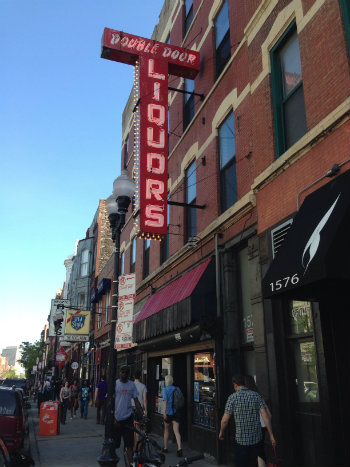Chicago Alderman Tells Property Owners to 'Come Back to Me on Your Knees' or Face Zoning Changes
Meet Alderman Proco Joe Moreno, the petty tyrant of Chicago's First Ward who uses "aldermanic privilege" to do whatever he wants.

When the Double Door, a bar and music venue in Chicago's Wicker Park neighborhood, violated the terms of its lease in 2016, the club's owners ended up in court with the owner of the property where it was located. The property owners wanted to evict the club, and a judge agreed that they were allowed to do that.
It was a private dispute between two businesses, the sort of thing that is routinely settled by the legal system. Or at least it was routine until the local city alderman got involved in the fight. In the months after a court ordered the Double Door to vacate the property at 1572 N. Milwaukee Ave., Alderman Proco Joe Moreno (1st Ward) tried to pressure the building's owners into letting the club stay, then attempted to change the zoning rules for the property to limit what businesses could occupy the space, potentially costing the building's owners thousands of dollars in future rent payments.
When Brian Strauss, one of the property owners, confronted Moreno about his actions, the alderman threatened to prevent Strauss from being able to get any new tenants in the building for three years, and told Strauss to "come back to me on your knees" when he was ready to negotiate.
Project Six, a Chicago-based political watchdog group, this week published the explosive story of Moreno's interference with the eviction of the Double Door club, including video of the confrontation between Strauss and Moreno where the city alderman appears to threaten the property owner. (Read the whole thing here.)
In his efforts to prevent the club from being removed, Moreno appears to be invoking what is known locally as "aldermanic privilege," a long-standing but unofficial policy in Chicago city politics that allows individual alderman to make unilateral decisions within their own wards. Even though the practice has no basis in law—and, frankly, seems not only ripe for corruption but actually meant to encourage it—Project Six details how it allows individual alderman to make determinations about zoning changes and permitting for all businesses within their wards.
"The practice creates an environment in which alderman act as gatekeepers to the residents and businesses of their wards, with essentially no checks and balances," Project Six reporters Faisal Khan and Kelly Tarrant explain. "The power and influence that Chicago's elected officials hold over city residents and businesses is immense. Some aldermen themselves have even compared their power to the powers of Medieval lords in charge 'of their individual fiefdom.'"
In the dispute between Strauss and the owners of the Double Door, Moreno may have had another reason to get involved. Campaign finance records uncovered by Project Six show that the club's owners donated more than $7,500 to Moreno since 2013, including an "in-kind" donation of $5,000 for hosting a campaign event for the alderman. The owners of the property, meanwhile, have not donated to Moreno.
That shouldn't matter, of course, because things like zoning decisions should exist outside the realm of politics. But when a single elected official can decide how any property within his jurisdiction is used, the two are inevitably going to become muddled.
Moreno's proposed zoning change has not yet been approved by the city council, but it would restrict future commercial establishments on street level and make it harder for the building's owners to renew residential leases on other floors. The change would affect only a single property and would leave the rest of the surrounding neighborhood untouched. It's not clear whether the city council will approve the change, but the real purpose of the proposal seems to be threatening the building's owners. So-called "spot zoning" like that has been successfully overturned in court, but only after long and costly legal battles.
Apparently not satisfied with making those implicit threats, Moreno also explicitly threatened Strauss, according to video obtained by Project City and CBS Chicago.
This isn't the first time Moreno has used his "aldermanic privilege" to intervene in the affairs of a private business. Back in 2012, he tried to exert his influence to prevent a Chick-fil-A restaurant from being built in his ward because, as the Chicago Tribune reported at the time, he disagreed with the fast food chain's top executive's opposition to gay marriage. The year before that, as the Tribune also reported, Moreno wielded his aldermanic privilege to block plans for a Wal-Mart in his ward, saying he had issues with the property owner and that Wal-Mart was not "a perfect fit for the area."
All of that says something about Moreno—namely, that he's acting like a petty tyrant on Chicago's North Side—but it says more about the insanity of the concept of aldermanic privilege. The rule of law requires that government officials have their authority held in check, specifically to prevent abuses like the ones that Chicago's civic system seems to encourage. Moreno is free to believe that Chick-fil-A's executives are wrong about gay marriage, and he's free to dislike shopping at Wal-Mart. He should not be able to use his position of authority to block those businesses from operating in his ward, and he certainly shouldn't be able to threaten property owners with targeted zoning changes if they don't kneel before him, as if he were some sort of feudal lord.
"Aldermen having such extreme power over bureaucratic issues provides little to no benefit or streamlining for residents and creates a culture ripe for abuse and corruption," conclude Khan and Tarrant, from Project Six. "Chicagoans deserve a city government that implements laws and policies based on what is best for all residents, not just those with the ear and pocket of an alderman."


Show Comments (42)